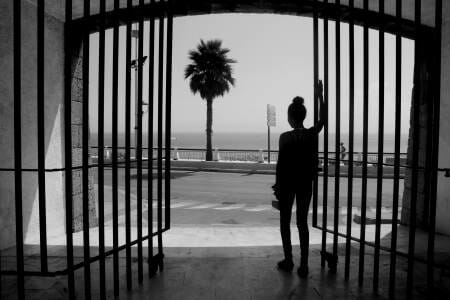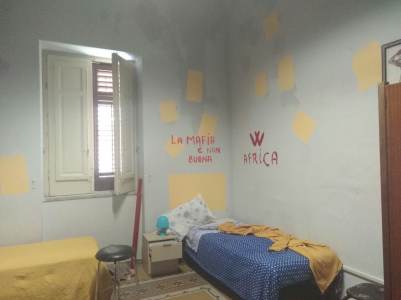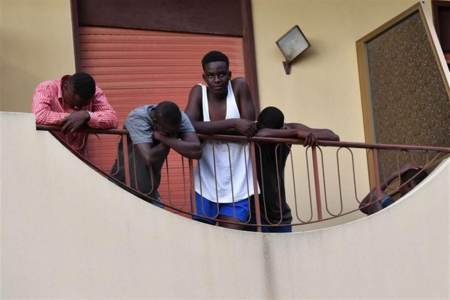The Straight Back of Grace
Grace, whose name has been changed by the author, is a thirty-nine-year-old female emigrant from the Ivory Coast. She arrived on the Italian coast in January 2018 in a life-threatening condition. She was saved, reanimated, and was able to survive, together with her six-year-old daughter. Grace applied for asylum and was brought to the asylum seeker reception center at Mineo. Here she has been living for over a year in inadequate surroundings although she has a claim for being accommodated at a SPRAR, a protection facility for asylum seekers and refugees, due to her vulnerable conditions.
The story of Grace is marked by gendered violence. Like many women Grace was a victim of female genital mutilation, a practice happening all over the world. Having control over her body is a powerful mechanism to influence a woman’s sexuality, culture, and femininity.
This unbearable situation under which her daughter had been suffering as well has pushed Grace to flee from the Ivory Coast to Europe. Due to the genital mutilation, she is suffering from serious health issues. Yet not even these can keep Grace from the long journey. Her journey takes her through Libya where she is tortured in prisons. Her health continues to deteriorate; Grace suffers from a urinary tract and kidney infection and additionally experiences breathing difficulties and the psychological effects of her fleeing. Grace’s health issues remain untreated even after her arrival in Italy.
Her backpain is excruciating, says Grace. Only due to her daughter she is still able to walk tall, who was also a victim of female genital mutilation and sexism in the Ivory Coast. “I’m ready to endure all of this for the well-being of my daughter. I have to continue to fight like I have before, I cannot give up,” says Grace.
During the legal procedure to attain asylum, Grace is suffering from another setback in September 2018. Her application for international protection is declined. She only receives a residency permit for humanitarian reasons. The outcome of her asylum procedure underlines yet again a practice we observe repeatedly: The local commission underestimates the threat of gendered discrimination and violence from which Grace had fled as well to protect herself and her daughter from persecution.
Grace, who can neither read nor write, lives in a symbiotic relationship with her daughter who attends the primary school in Mineo and speaks several languages. Together mother and daughter try to deal with the harsh conditions of living in the reception center of Mineo. They experience little of the medical and social support to which they have a right.
At the entrance of the reception center the girl tells us in Italian from her experiences at school. Grace, on the other hand, talks about the increasing physical and psychological pain which does not subside although she is taking tranquilizers on a daily basis. Instead, the life in the reception center makes her pain much worse. Nevertheless she persists, telling us that she has always continued going on her own and that she also wants to continue. “I have to keep going. I have realized that there is nothing here for me and my daughter. My daughter has to live in a fair and free world, she cannot be exposed to any violence,” says Grace.
What becomes clear from this conversation is that no one has informed Grace that she could appeal the verdict of the local commission and be transferred to a SPRAR. Tired from being trapped in a hopeless situation, Grace decides to go down another road. In April, while we were walking around the market of Catania, she proclaimed that she wants to move north to Turin. She would be able to live with a friend there. Grace hopes to find work in Turin to be able to start an autonomous life. “We cannot stay in this hell, in this reception center any longer. The problems won’t end, we have to face them because I cannot give up. I have to bring my daughter to a place where she has a better life. We have to keep going. Ça va aller, it will be alright. Thank you for everything.,” says Grace with a strength drawn from her self-determination.
We only know too well that Grace is not the only migrant who has learned the lack of support and safety the hard way. The persecution of special vulnerability she has lived through is also not an isolated case. There are many especially vulnerable migrants whose rights are impinged upon. To the suffering they have experienced both in their countries of origin and on their flight more suffering is added in Europe. However only if they make it to Europe without dying in the desert before or drown in the Mediterranean. Additionally, the possibility of attaining sufficient protection and care has been further diminished by the new safety decree.
Grace gives us strength as she has not stopped to fight in face of all these aggravating circumstances. And as she does, so do many women. They defy the painful injustices and follow their path walking tall on their rightful search to fulfill their dreams.
Silvia Di Meo
Borderline Sicilia
Translation: Annika Schadewaldt





